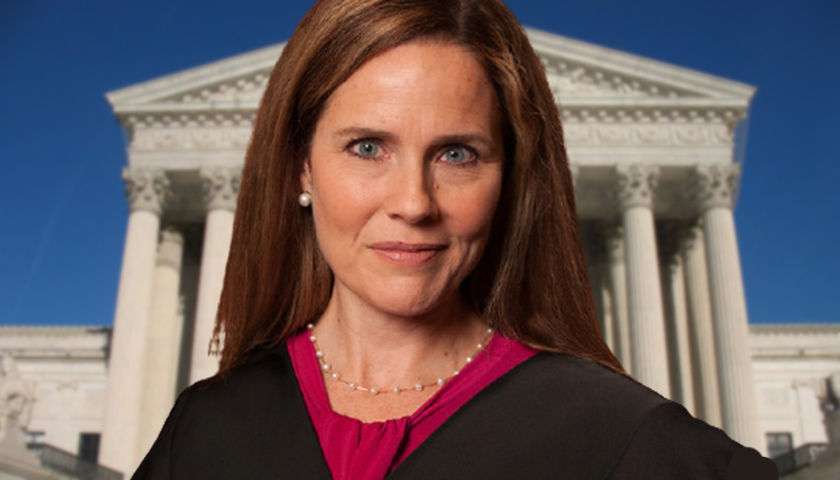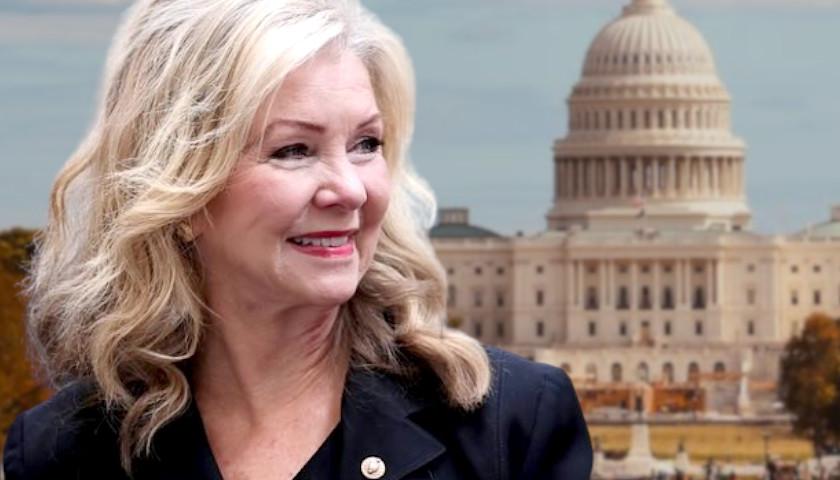by Roger Kimball
As I write, President Trump has just confirmed what the rumor mill has been disgorging with increasing confidence over the last few days: Judge Amy Coney Barrett is his pick to replace the feminist icon Ruth Bader Ginsburg, who died at 87 a little over a week ago, as a justice on the U.S. Supreme Court.
The wheels of government tend to turn slowly, but Donald Trump has once again demonstrated that if need be, they can be made to turn with dizzying speed.
He did it last spring when he mobilized the awesome resources of American business to produce a mountain of medical materiel in record time to meet the emergency sparked by the Chinese virus.
And he just did it again by nominating Judge Barrett to meet the political emergency threatened by anti-democratic forces massing to upset the 2020 election.
Senate Judiciary Committee Chairman Lindsey Graham (R-S.C.) has already announced that Barrett’s confirmation hearings will begin October 12. With the Republicans holding a 53-47 majority, and with no more than two likely defections (at most), she is likely to be seated before the election on November 3. It is imperative that the Supreme Court, which may be called to rule upon various electoral anomalies, be sitting with its full complement of nine justices.
Barrett graduated first in her class from Notre Dame Law School and then held two clerkships, the second for Justice Antonin Scalia. She was in private practice briefly before returning to teach law at Notre Dame, where she still teaches. In 2017, President Trump nominated her for the 7th U.S. Circuit Court of Appeals.
I became aware of Judge Barrett in 2018 after Justice Anthony Kennedy announced his retirement. Her name appeared on a shortlist of candidates for Kennedy’s replacement. In the event, President Trump nominated Brett Kavanaugh, whose disgraceful treatment during his hearings by Democratic senators and the media is still horrifying to contemplate.
Will Barrett face the same level of unhinged vituperation? I think it unlikely, though I remember a conversation I had with a well-informed legal observer in the immediate aftermath of Kavanaugh’s confirmation. “Well, the public was so repelled by that spectacle that Trump’s next nomination is likely to go more smoothly,” I said.
“No,” insisted my friend. “Next time it will be much worse.”
It’s early yet, but the response to Barrett’s nomination has been nearly comical in its combination of hysteria and nonentity.
Gosh. Worse than Christine Blasey Ford claiming Kavanaugh assaulted her 30-odd years earlier at a high school party? Worse than Michael Avenatti (remember him?) with his harem of stooges charging the mannerly Kavanaugh with all manner of sexual impropriety? Worse than Senator Kamala Harris (D-Calif.) haranguing him or Senator Sheldon Whitehouse (D-R.I.) attempting to parse entries from his high school yearbook? I am not sure how it could be worse.
Doubtless, Barrett’s Catholicism will be an issue, as it was during her confirmation hearings for her current position. We’re certain, I think, to get variations on Senator Dianne Feinstein’s “the dogma lives loudly within you” meme. It was supposed to be a crushing remark—Dogma? Dogma? Who pays any attention to dogma in these sophisticated times?
Its effect, however, was to turn Barrett into a hero for many. There are more than 70 million registered Catholics in the United States, some 22 percent of the population. That is a reality that any politician will have to conjure. Not all of them are “devout” in the way that Joe Biden says he is.
When he came to office, President Trump promised to nominate judges and justices in the stamp of Antonin Scalia—that is, jurists who saw their task as interpreting the law in light of the Constitution, not promulgating public policy from the bench.
This he has done. And, as her record indicates, this is exactly what Amy Barrett will seek to do. As she noted during her earlier confirmation hearings, the fact that she is Catholic is “irrelevant” to the job of being a judge or justice. “A judge,” she said in 2019, “is obligated to apply the law as it is and not as she wishes it would be. She is obliged to follow the law even when her personal preferences cut the other way, or when she will experience great public criticism for doing so.”
It is early days yet. But as of this writing, the response to Barrett’s nomination—it’s been building ever since Ruth Bader Ginsburg died and Barrett’s name was again in the mix—has been nearly comical in its combination of hysteria and nonentity. A “SCOTUS Rapid Response Action Guide” has been circulating for a while with tips on how to protest President Trump’s nomination, whoever it might turn out to be.
To me, one of the many things to admire about Judge Barrett is her commitment to family. She has seven children, two of whom are adopted from Haiti, and the youngest of whom has Down Syndrome. Bizarrely, the Left has seized on this aspect of Barrett’s life, especially her adoption of two “children of color,” as grounds for criticism. Someone on Twitter speculated about whether the adoption process in Haiti was on the up and up. But it took a professional race hustler to crank up the absurdity to genuinely woke proportions.
Ibram X. Kendi, né Henry Rogers, author of the bestselling How to Be an Antiracist, really got the ball rolling with a Twitter thread that began with the declaration that
Some White colonizers “adopted” Black children. They “civilized” these “savage” children in the “superior” ways of White people, while using them as props in their lifelong pictures of denial, while cutting the biological parents of these children out of the picture of humanity.
Desperate, what? Take a generous act and filter it through your racialist scrim to turn it into something nasty and culpable.
It’s of a piece with the gambit that People of Praise, a Catholic group to which Barrett belongs, was the inspiration for Margaret Atwood’s dystopian novel The Handmaid’s Tale. (Our paper of record was on it!) It wasn’t, as publications from Vox to National Review have acknowledged.
No, the Left is going to find Amy Coney Barrett a tough nut to attack. She is smart. She is pleasant. She is competent. Her personal history is an open book of service and commitment. A sign of how hard a time the Left is going to have in any campaign to discredit her was a list of strategies I saw in the responses to Kendi’s tweet. There are a few items of boilerplate: she was critical of Obamacare, for example, but then so are a lot of people.
My favorite observation, though, was this: “Name deceptively evokes Coney Island, a place that is good.”
Is that it? Is that all they’ve got? Pretty pathetic, I’d say.
I am looking forward to cheering Justice Barrett after she sails through her hearing and the Senate votes to confirm her nomination to the Supreme Court.
– – –
Roger Kimball is editor and publisher of The New Criterion and the president and publisher of Encounter Books. He is the author and editor of many books, including The Fortunes of Permanence: Culture and Anarchy in an Age of Amnesia (St. Augustine’s Press), The Rape of the Masters (Encounter), Lives of the Mind: The Use and Abuse of Intelligence from Hegel to Wodehouse (Ivan R. Dee), and Art’s Prospect: The Challenge of Tradition in an Age of Celebrity (Ivan R. Dee).
Photos “Supreme Court” by Kjetil Ree CC BY-SA 2.0 and “Amy Coney Barrett” by Rachel Malehorn CC BY 3.0







